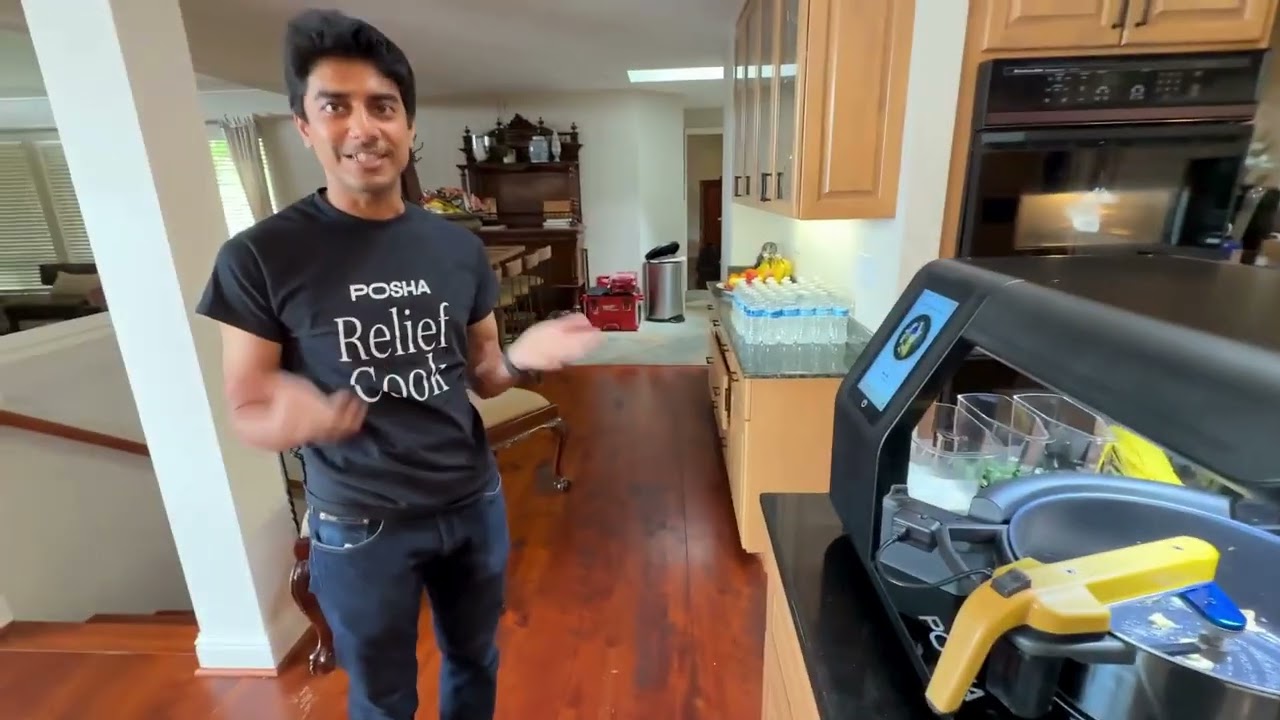For the past five or so years, the emails have landed in my inbox on a steady basis, nearly every month. They’ve included updates on a small startup building a countertop cooking robot named Posha.
The emails, almost always written by the company’s CEO and co-founder, Raghav Gupta, detail progress, both big and small, ranging from software tweaks and field trial insights to news of an $8 million Series A funding round.
The progress has been slow but steady. And over the past year, the company has reached a milestone that most cooking robot startups (especially those targeting the home) haven’t come close to: they’re now building robots using scaled manufacturing, and those robots are arriving in customer homes.
Given that I’ve followed dozens of companies attempting this goal over the past decade, I figured I’d take Raghav up on his invite to see the robot in action and talk with him about what’s next.
So this past Sunday, I headed to an Airbnb Raghav had rented north of Seattle to demo the Posha robot for media and investors. Raghav asked if I wanted to cook a meal with Posha, and within minutes of arriving, the robot was preparing spaghetti Alfredo.
The machine stirred, heated, and timed each step with minimal interaction from me. Posha includes four ingredient containers, multiple spatulas, a spice carousel, and an induction cooktop. A camera watches over the food, analyzing “color, texture, consistency,” and, according to Raghav, provides “human chef-like intelligence.” Users load chopped ingredients, select a recipe, and let the device do the rest. “You just tell Posha you need that, and you walk away,” Raghav explained.
Posha, originally named Nymble (both the robot and the company), has changed significantly from its early days as a college project. “We were two people taking out of our parents’ garage trying to make a cooking robot.”
The first version was a robotic arm, but Raghav said customer feedback led them to pivot. “We had this choice of either repurposing our robotic arm for commercial kitchen use cases or changing our technology altogether to make something that consumers wanted. We chose the latter route because we were in love with the problem we were trying to solve.”
That problem: helping people figure out what to eat on a daily basis. “People like you and me want to eat freshly cooked meals and feed our families freshly cooked meals. But it’s hard to find the time to cook these meals every single day.” He believes this tradeoff, between eating well and having enough time, is what led to a national health crisis. “We are in the middle of a health catastrophe,” he said. “And I think with Posha, it will help America become one of the healthiest countries in the world, at the same time being one of the most productive countries in the world.”
Those are lofty goals, ones I’m pretty skeptical about given the high price tag of the Posha and the nearly non-existent adoption of cooking robots so far. But according to Raghav, he sees his product as a natural evolution of a device that has been quite successful, especially in Europe: the Thermomix.
“I think we have a strong precedent in terms of Thermomix. They sell like a million units every single year, and what Posha is, is actually Thermomix++.”
If there’s a model to aim for, the Thermomix is a good one, and I have to say, the ease with which I was able to make spaghetti Alfredo was reminiscent of the first time I used a Thermomix. In fact, it was essentially what Raghav described, the Thermomix++, in that it required me to do even less once I picked the recipe and hit go. From there, over the next 30 minutes, the Posha added ingredients and cooked the meal to completion.
It’s perhaps this ease of use and the similarity to Raghav’s professed North Star in the Thermomix that helped the company recently raise over $8 million in Series A funding. You’d have to be living under a rock, covered with more rocks, and then some dirt not to realize how hard it is for consumer hardware startups to raise money (let alone a robot cooking startup). The fact that Posha secured funding led by Accel is a sign they may be doing something others in this space haven’t.
So far, Posha has shipped 200 units, with 600 more expected by the end of September. “We’re trying to grow 3X every six months or so,” Raghav said. The product retails for $1,750, with pre-orders at $1,500.
If you’d like to see Posha in action, check out my cooking video below. Raghav will also be speaking about his journey at the Smart Kitchen Summit this week, so if you want to hear more and ask him questions, make sure to grab your ticket..

Did you miss our previous article...
https://ballerawards.news/epicure/this-culinary-tech-inventor-thought-he-could-build-some-parts-for-his-latest-gadget-in-the-us-then-he-called-around






